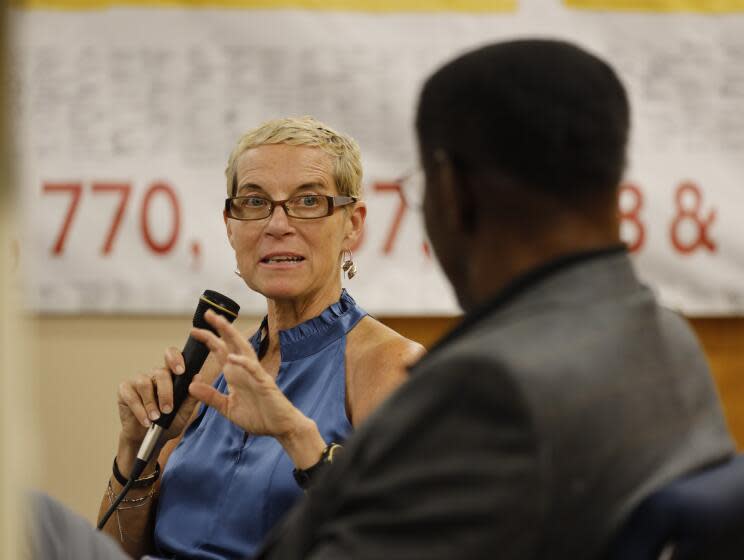Jane McAlevey, a driving force in the labor movement, dies at 59

Jane McAlevey’s advice to unions around the world was as simple as it was transformative: Workers should lead the way.
The prominent labor organizer, author and senior policy fellow at the UC Berkeley Labor Center died on Sunday of multiple myeloma cancer.
Southern California union locals representing grocery workers credit McAlevey, who consulted with and worked for various labor groups over the years, with fundamentally changing the way they operate, including at the bargaining table, where workers now are the ones going toe to toe with corporate negotiators.
“It’s kind of changed the way we do everything,” said Kathy Finn, president of United Food and Commercial Workers Local 770. “She changed the way I see the labor movement.”
Finn said UFCW chapters are sometimes run "very very top-down, where the president thinks they are the smartest person in the room." But McAlevey taught that only workers can truly understand their circumstances, Finn said, and they are the people who can best empower their colleagues to push for better contracts.
Norma Leiva, who has worked at a Food 4 Less in Panorama City for more than 30 years, said the difference in her union local has been stark — and changes have quickly spread to other UFCW locals representing Southern California grocery workers.
“Deals were being done and members had no idea of what was going on. Now, we are involved from Day One. We are there in the center of it all,” Leiva said.
Leiva recalled participating in one of McAlevey’s online workshops during the pandemic, in which McAlevey offered advice on how employees could engage their co-workers on labor issues.
"She would tell us, you need to be able to hear people, listen to their story — their struggles, their concerns. That's how you can understand them and come together. She showed us how to build power. Big corporations aren't going to be able to define what we can do, if we join together and we have a voice together."
Addressing a room of union organizers, rank-and-file members and others gathered at the UFCW Local 770 office in downtown Los Angeles last summer, McAlevey spoke with gusto about a frenzy of Los Angeles labor actions that had earned the title “hot labor summer” and chastised unions that engage in closed-door negotiations.
"Commit to transparency," she said at the event, which was tied to the release of what would be her final book, “Rules to Win By: Power and Participation in Union Negotiations,” which she co-authored with Seattle labor lawyer Abby Lawlor.
In the book, McAlevey and Lawlor argued for what they described as a more democratic and transparent model of organizing. They held up Boston hotel workers, educators in New Jersey, nurses in rural Massachusetts and hospital workers in Germany, among others, as examples. (They also wrote favorably about the union work of Times reporters.)
“Corporations are not paying their fair share,” she told The Times in an interview at the time. “There’s plenty of goddamn money in a state with as many billionaires as California has, and if they were contributing appropriately, we would have way more justice in this city and in the whole state.”
McAlevey grew up in a politically active family. She cut her organizing teeth when she attended college at State University of New York at Buffalo. There, she protested tuition hikes, went on to lead the state university system’s 64-campus student association and pushed for divestment from apartheid South Africa. In 1985, she was jailed for 10 days after helping hundreds of students occupy a SUNY building in connection to the divestment movement, McAlevey told the New York Times.
McAlevey eventually dropped out of college and spent a decade in the environmental justice movement before joining the labor behemoth AFL-CIO, where she helped to organize nursing home workers, taxi drivers, janitors and city clerks in Connecticut.
She traveled frequently, working for various unions that were often locked in contract fights. When she wasn’t on the road, she split her time between New York City and the Bay Area, where she had a cabin in Muir Beach, she told The Times in an interview last summer. It is where she died on Sunday.
McAlevey had been battling cancer since 2021 and made public she was terminally ill last fall. In a letter to friends, family and colleagues she wrote in April that she had entered hospice care and was holding close the words of activist and writer Audre Lorde: “I am deliberate and afraid of nothing.”
This story originally appeared in Los Angeles Times.

 Yahoo News
Yahoo News 
